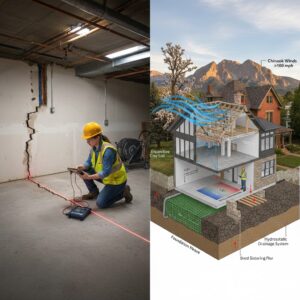When you’re planning a home renovation, it’s easy to get caught up in the excitement of choosing new paint colors, flooring, and furniture. But before you start knocking down walls, it’s crucial to consider the structural integrity of your home. That’s where a structural engineer comes in.
But when do you really need to hire a structural engineer for a renovation? To help you answer that question, we’ve outlined several key projects and situations where their expertise is essential.
When to Hire a Structural Engineer for a Renovation
1. Are You Removing or Altering Walls?
One of the most common renovation projects that requires a structural engineer is the removal or alteration of walls to create an open floor plan.
- Load-Bearing Wall Removal: If you’re planning on removing a wall, you first need to determine if it’s a load-bearing wall. These walls are critical to the structural integrity of your home, as they support the weight of the roof and/or the floor above. A structural engineer can identify load-bearing walls and design the necessary support system (like a beam or column) to ensure your home remains safe and stable.
- Altering Openings: Even if you’re not removing an entire wall, but just widening a doorway or window, you may still need a structural engineer. Altering the size of an opening can affect the load distribution in the wall, and an engineer can provide the necessary calculations and drawings to do it safely.
2. Are You Adding a Storey or a Room Addition?
Expanding your home’s footprint with a room addition or adding a second story is an exciting prospect. However, these projects add significant weight to your home’s existing foundation and structure.
- Foundation Assessment: A structural engineer will assess your current foundation to determine if it can support the additional load. If not, they will design a new foundation or recommend modifications to the existing one.
- Structural Design: The engineer will also design the structural components of the new addition, including the walls, floors, and roof, to ensure they are properly integrated with the existing structure and comply with building codes.
3. Are You Making Changes to the Roof or Ceiling?
Your home’s roof and ceiling are more than just a cover over your head; they are integral parts of the structure.
- Vaulting a Ceiling: Vaulting a ceiling is a popular way to create a more spacious feel. However, it often involves removing ceiling joists that may also be acting as roof trusses. A structural engineer can design a new support system to maintain the roof’s stability.
- Adding a Dormer or Skylights: Adding a dormer or large skylights can also impact your roof’s structure. An engineer can ensure these additions are properly framed and supported.
- Solar Panels: Installing solar panels adds weight to your roof. A structural engineer can assess your roof’s capacity to handle the extra load.
4. Are You Designing an ADU (Accessory Dwelling Unit)?
Whether it’s a new detached backyard cottage or a conversion of your garage, an ADU is a new dwelling that requires a solid structural design. A structural engineer is essential for designing the foundation, walls, and roof system to ensure the unit is safe, durable, and fully compliant with local building codes.
5. Are You Building a New Deck?
A deck, especially an elevated one attached to your house, must be designed to safely support the weight of people, furniture, and even snow. A structural engineer will design the footings, joists, beams, and the critical connection to the main house structure, preventing collapses and ensuring long-term safety.
6. Are You Converting a Crawl Space or Increasing Basement Ceiling Height?
These major projects involve excavating soil from beneath your existing home. This process, known as underpinning, can compromise your home’s foundation if not handled expertly. A structural engineer is absolutely critical to design the process of safely deepening the foundation to create a full-height basement without jeopardizing the stability of the entire house above it.
7. Are You Concerned About Cracks or Other Signs of Structural Issues?

Sometimes, the need for a structural engineer isn’t about a planned renovation, but about addressing potential problems. If you see any of the following, it’s a good idea to call an engineer for an inspection:
- Cracks in your foundation, walls, or ceilings
- Sagging floors or ceilings
- Doors or windows that stick or don’t close properly
- Leaning or bulging walls
A structural engineer can diagnose the cause of the problem and recommend the best course of action for repairs.
for more information you can read our article ” signs of foundation damage “
8. Do You Need Inspection of Construction and Structural Repairs?
During a major renovation, you may want an independent expert to verify that work is proceeding according to the approved plans and to industry standards. A structural engineer can perform milestone inspections (e.g., before concrete is poured or walls are closed up). They are also the right professionals to design and oversee complex structural repairs to ensure they are completed correctly.
Why You Can’t Skip Hiring a Structural Engineer
Some homeowners are tempted to skip hiring a structural engineer to save money. However, this can be a costly mistake. Without a structural engineer, you risk:
- Safety Hazards: An unsafe structure can lead to collapse, causing serious injury or even death.
- Costly Repairs: Fixing structural problems after the fact is much more expensive than getting it right the first time.
- Building Code Violations: Failure to comply with building codes can result in fines and legal issues.
- Problems When Selling Your Home: Potential buyers will likely hire a home inspector who will identify any structural issues, which can derail a sale.
suggestion: How Much Does a Structural Engineer Inspection Cost in Denver
Your Next Steps
If you’re planning a home renovation and your project involves any of the scenarios above, your next step is to consult with a qualified structural engineer. At ISTA Engineers, we have years of experience helping homeowners in the Denver greater area with their renovation projects. you can use our services like:
Commercial Structural Engineering Services in Denver
Government Structural Engineering Services in Denver
Residential Structural Engineering Services in Denver
Ready to start your project with confidence? Contact us today for a consultation.
- Phone: (720) 740-4060
- Email: info@istaengineers.com
Frequently Asked Questions
Q: Can my contractor or architect tell me if I need a structural engineer? A: While experienced contractors and architects can often identify when a structural engineer is needed, they are not a substitute for one. A structural engineer has the specialized knowledge and qualifications to perform the necessary calculations and provide the certified drawings required for building permits and compliance.
Q: How much does it cost to hire a structural engineer? A: The cost of hiring a structural engineer will vary depending on the scope and complexity of your project. However, the cost is a small price to pay for the peace of mind that comes with knowing your home is safe and your renovation is built to last.
Q: What is the difference between a structural engineer and an architect? A: An architect is primarily focused on the aesthetics and functional layout of a space. A structural engineer is focused on the “bones” of the building—the structural system that keeps it standing. For many renovation projects, you will need both.
Conclusion
Hiring a structural engineer isn’t just about following the rules; it’s about ensuring the safety, stability, and long-term value of your home. By understanding when you need to bring in an expert, you can proceed with your renovation confidently. For any project that involves altering your home’s structure, a structural engineer is an essential member of your team.




